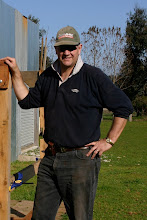I just watched this week's Landline program. It had 3 stories where there was a Bush / City conflict of significant dimension. No surprise ... the Bush is losing every one. I felt a lot of sympathy for:
- small scale timber mills producing hardwood sleepers and the like who are being driven out of business by a combination of big mills, imports and environmentalists;
- aboriginal and other people adversely affected by Queensland's Wild Rivers legislation; and
- Murray Darling irrigation towns who want some recognition of the consequences of water reallocation proposals.
I've been part of a world view that believes good pricing generally leads to good outcomes. I don't use the word 'efficient' as an economist would, but I mean many of the same things. This world view has, unfortunately, been a significant part of screwing the Bush blind for, at least, several decades.
Good pricing means people see the real price of things over the medium term. What I would term real prices are something between short run and long run marginal cost - with the excess distributed with some sort of equity.
Far too often over the last 30 years, the Bush sees too little equity - and precious little common sense besides. It has to sell into markets where it faces systemic (but usually) unacknowledged market power, but then faces heavy access and price discrimination on their inputs.
We should recall that Australia is built, right back to white settlement, on agriculture and mining. These are pretty much the only things we have ever produced on a consistently, globally competitive basis. Miners seem to be big enough to look after themselves, but for at least 50 years farmers have lacked the capacity to get a fair share.
I'm a bit sensitive to this point partly because of a conversation I had with a colleague last week. We were talking about my likely access to the benefits of the NBN - 50 km from the centre of Melbourne and 5 km from a reasonably substantial town. No fibre for me! Apparently I will likely (possibly) get access to the internet at 12 MB / sec (as against my current 0.16 MB / sec). My City (and town) friends are going to get 1 TB / sec via their fibre!
When I complained, my colleague looked at me with a resigned look that said I should be grateful of getting anything - and didn't I understand that I was just paying what it cost.
I've made a mental note to sell him some very expensive food if his food distribution system ever breaks down and he turns up at my gate.
I don't actually think the answer lies very much in any sort of political action. Farmers / rural people are just too few to ever win that way. People treat people like Bob Katter as a clown - when he is actually saying some things that are no more unreasonable than the rubbish my colleague thinks of as perfectly ok.
To me the answer has to be a market one - where we just don't sell through the industrial / supermarket system that has served us so poorly, but create parallel distribution channels that dis-intermediate food processors and supermarkets like they dis-intermediated the wholesale / retail system that used to serve producers a bit more equitably.
It may be that peak oil or other developments turns things in our direction at some stage. I don't really know that I hope for that. Another story on Landline was about the Bowen poisonings of the water of a tomato nursery. That nursery apparently supplied farms that produce (at least at certain times of the year) some 60% of Australia's tomatoes.
The poor sods directly affected by this I feel sorry for. The punters in the City who get to miss out on their tomatoes - or have to pay more for them - I feel somewhat less sympathy for.
E
S




I'm sympathetic to your viewpoint but, on balance, Bob Katter is a clown...
ReplyDelete